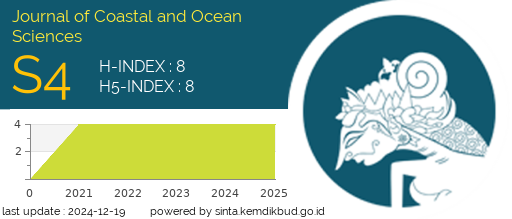Assessment of Marine Ecotourism Development Potential in Lapin Beach, North Rupat, Riau Province
DOI:
https://doi.org/10.31258/jocos.6.3.139-149Keywords:
Marine Ecotourism, SWOT Analysis, Sustainable Development, Tourism Suitability IndexAbstract
Lapin Beach in North Rupat, Riau Province, has excellent potential to be developed as a marine ecotourism area due to its natural beauty and local cultural richness. However, no scientific research has explored this potential in depth. This study aims to analyze the potential and formulate strategies for the sustainable development of marine ecotourism in Lapin Beach to improve the welfare of local communities. The research was conducted from December 2024 to February 2025. Data were collected through observation, interviews, questionnaires, and water quality measurements. The analysis used is the coastal tourism suitability index and the SWOT approach. The results showed that Lapin Beach has strong potential for ecotourism, supported by easy access, natural panoramas, and community participation. The tourism suitability index ranged from 83.97 to 86.53%, indicating a high suitability (S1). Water quality and coastal topography support tourism activities. SWOT analysis suggested strategies including promotion, facility improvements, and community engagement in maintaining sustainability. Recommended development strategies include optimizing natural attractions, empowering local businesses, improving infrastructure, and enhancing monitoring efforts. Further studies should consist of aspects of biota, vegetation, and economic impact to support sustainable ecotourism management and enhance community well-being.
Downloads
References
[MCRMP] Marine Coastal Resource Management Program. (2004). Petunjuk Pengelolaan Pesisir dan Laut. Kementerian Perikanan. Jakarta.
Ali, M., Pratiwi, E.N., & Akib, M. (2024). Coastal Ecotourism Development Strategy Based on Community and Government Participation in Tanjung Bira and Lemo-Lemo Areas, Indonesia. International Journal of Sustainable Development and Planning, 19(7): 1970–1977.
Angessa, A.T., Lemma, B., Yeshitela, K., & Endrias, M. (2022). Community Perceptions Towards the Impacts of Ecotourism Development in the Central Highlands of Ethiopia: The Case of Lake Wanchi and its Adjacent Landscapes. Heliyon, 8(2): 1-13
Arikunto, S. (2016). Metode Penelitian Kualitatif. Jakarta: Bumi Aksara. 168 hlm.
Erniyati, E. (2023). Strategi Penegakan Hukum Pidana terhadap Pencemaran Lingkungan Hidup. Keadilan, 21(2): 134-146.
Faradilla, A. (2022). Identification of Marine Ecotourism Objects on Pulau Jemur, Riau Province, Indonesia. IOP Conference Series: Earth and Environmental Science, 348: 012032.
Fatkhurahman, F., Effendi, I., Effendi, I., Hadiyati, H., Akbar, M. R., Dawami, D., & Jamaan, A. (2024). Prospects and Analysis of Coastal Ecotourism in Malay Community. AACL Bioflux, 17(1): 360–373.
Ghimire, R.P. (2015). Ecotourism and its Role in Sustainable Development of Nepal. In R. K. Thapa (Ed.), Ecotourism, IntechOpen. 19 pp.
Laksmi, P.A.S., Arjawa, I.G.W., & Pulawan, I.M. (2023). Community Participation to Improve Tourism Industry Performance: A Case Study in Mandalika Lombok Tourist Area. International Journal of Social Health, 2(6): 377-384.
Mandic, A., & Kennell, J. (2021). Smart Governance for Heritage Tourism Destinations: Contextual Factors and Destination Management Organization Perspectives. Tourism Management Perspectives, 39(100862): 1-14
Noverianto, F. (2018). Analisis Kebutuhan Sarana dan Prasarana Penunjang Pariwisata di Desa Sembungan, Kecamatan Kejajar, Kabupaten Wonosobo. Universitas Diponegoro.
Pemerintah Republik Indonesia. (2021). Peraturan Pemerintah Republik Indonesia Nomor 22 Tahun 2021 tentang Penyelenggaraan Perlindungan dan Pengelolaan Lingkungan Hidup. Lembaran Negara Republik Indonesia Tahun 2021 Nomor 32.
Sawindri, A.A. (2016). Strategi Pengembangan Kampung Wisata Ekologis (KWE) "Puspa Jagad" sebagai Destinasi Ekowisata di Desa Semen Kecamatan Gandusari Kabupaten Blitar. Universitas Muhammadiyah.
Sugiyono, S. (2017). Metode Penelitian Kuantitatif, Kualitatif dan R & D. Bandung: Alfabeta. 334 hlm.
Susilawati, S. (2016). Pengembangan Ekowisata Sebagai Salah Satu Upaya Pemberdayaan Sosial, Budaya dan Ekonomi di Masyarakat. Jurnal Geografi Gea, 8(1): 43-50.
Warningsih, T., Kusai, K., Bathara, L., & Deviasari, D. (2023). The Impact of Marine Ecotourism Development in Rupat Island, Indonesia. Journal of Environmental Management & Tourism, 14(3): 866-871.
Yoswaty, D., & Samiaji, J. (2013). Ekowisata Bahari sebagai Alternatif Pemanfaatan Sumberdaya Pesisir Berbasis Konservasi. MSP–FPIK IPB. Bogor.
Yulianda, F. (2007). Ekowisata Bahari sebagai Alternatif Pemanfaatan Sumberdaya Pesisir Berbasis Konservasi. Disampaikan pada Seminar Sains 21 Februari 2007. Departemen FPIK. IPB. Bogor.
Yulianda, F., Kaber, Y., Bengen, D.G., & Dahuri, R. (2019). Mangrove Ecosystem for Sustainable Tourism in Dampier Strait Marine Protected Area, Raja Ampat. IOP Conference Series: Earth and Environmental Science, 404(012086): 1-12.
Downloads
Published
Issue
Section
License
Copyright (c) 2025 Aidil Rahmad Akbar, Joko Samiaji, Dessy Yoswaty (Author)

This work is licensed under a Creative Commons Attribution 4.0 International License.





